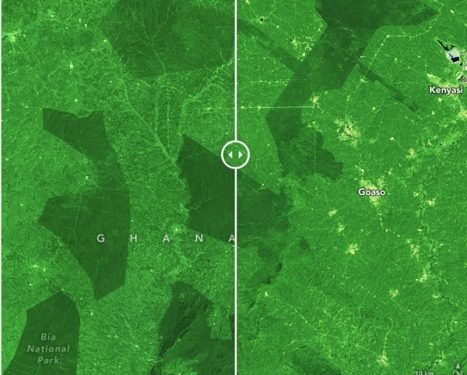News
NASA highlights Ghana’s declining forest reserves

In southwestern Ghana, a patchwork of tropical forest lies among widespread farmland dotted with towns. These forest fragments are remnants of the Upper Guinean forest of West Africa, a biodiversity hotspot that has been diminished by human activity and fires.
Primates, elephants, hippopotamuses, and butterflies are among the thousands of animals that live in the region’s primary forests, which are almost entirely within a network of forest reserves. But satellite images indicate that these protected forest remnants have become even smaller in recent decades.
The false-colour images above, acquired by the Landsat 4 and Landsat 9 satellites, show 12 protected forest reserves and Bia National Park in the Bia-Goaso forest district in 1989 (left) and 2023 (right). The forested canopies of the reserves are dark green, whereas the surrounding landscape is lighter green.
“This area has historically been an important forest habitat for biodiversity, but elephant populations have declined precipitously because of human encroachment and habitat degradation,” said Michael Wimberly, a professor of geography and environmental sustainability at the University of Oklahoma. The photograph below, taken by Wimberly, shows intact forests in a reserve east of the Bia-Goaso region.

Wimberly and a team of researchers in the United States and Ghana used Landsat data to study forest degradation, loss, and recovery in the reserves across Ghana from 2003 to 2019. Although vegetation change was relatively slow from 2003 to 2015, it picked up significantly between 2015 and 2019.
Overall, there was more forest loss and degradation than recovery, resulting in a gradual decline of tree cover.
The drivers of change here are multifaceted, noted Wimberly. In 2016, drought associated with El Niño parched forests and promoted fires across more than 12 percent of Ghana’s moist semi-deciduous and upland evergreen forests. Forest loss was especially prevalent in a reserve known as Bonsam Bepo, south of the city of Goaso.
In a reserve southeast of this image, mining operations contributed to forest loss. In the reserve north of Bia National Forest, widespread logging for timber from 2017 to 2019 led to forest degradation. In other reserves, such as Krokosua (the u-shaped reserve at the bottom of the image), the expansion of cocoa farms has consumed forest. Ghana and neighbouring Côte D’Ivoire produce about two-thirds of the world’s cocoa.
A 2024 United Nations report on the state of the world’s forests highlighted the Forest Data Partnership, an effort to help people in Ghana access remote sensing data to track commodities linked to deforestation and prevent forest loss.
The approach is being field-tested in Ghana and at the joint NASA-USAID SERVIR program’s regional hub for West Africa to help make agricultural production and food systems more sustainable.
Wimberly and colleagues continue to monitor Ghana’s tropical forest landscapes and forest reserves using Landsat data and models to classify the health of forests. Their updated results can be explored in this interactive map.
Source: earthobservatory.nasa.gov
News
38-year-old woman arrested for stealing one-week-old baby at Wa Market

The Upper West Regional Police Command has arrested a 38-year-old woman, Abena Martha Maanibeh, for stealing a one-week-old baby and other valuables belonging to the baby’s mother at Wa Market (Kejetia).
According to a police statement, the incident happened on August 10, 2025. The complainant, Ms. Kwofie Mwinbelle, had given birth to a baby boy at the Wa Regional Hospital on August 1.
The suspect, who was working as a caretaker for another patient at the hospital, tricked the new mother into following her to Wa Market to buy baby diapers.
She then took advantage of the situation to run away with the baby and the mother’s handbag, which contained a mobile phone, cash, and other items.
Police investigations, led by ASP Stella Atukwia of the Domestic Violence and Victim Support Unit, traced the suspect to her hideout at Nuobollie in the Savannah Region.
She was arrested on August 15, 2025. The stolen baby was found safe and reunited with his mother, and some of the stolen belongings were recovered.
The suspect appeared before the Wa District Magistrate Court on August 18, 2025 and has since been remanded into custody and will reappear on September 2, 2025.
The Upper West Regional Police Command assured the public of its commitment to protect lives and property.
It also thanked residents for their vigilance and support, which helped in arresting the suspect.
By: Jacob Aggrey
News
NPP is a diverse party, let’s end religious and tribal bigotry campaigns – Dr. Bawumia

Flagbearer hopeful of the New Patriotic Party in the 2028 elections (NPP) and former Vice President of the Republic of Ghana, Dr. Mahamudu Bawumia, has cautioned against the use of religious and tribal sentiments in the party’s internal campaign.
Dr. Bawumia expressed concern that some campaigners and flagbearer hopefuls were introducing divisive arguments, including claims that delegates should not vote for him because his wife is not a “true Ghanaian.”
He described such claims as disturbing and unrepresentative of the values of the NPP.
“We are a very diverse party covering four religions and all tribes. It is important that we remain united,” he said.
He urged his opponents to contest on the strength of their vision, mission, ideas, integrity, and track record, rather than attacking personalities based on religion or ethnicity.
Citing his own record, Dr. Bawumia reminded party members of his contributions to the NPP’s victories in 2016 and 2020, including his role in the 2013 election petition and his wife Samira’s nationwide campaign efforts.
He noted that at those times, nobody questioned his background or his wife’s identity.
He stressed that attempts to divide the party along religious or tribal lines do not reflect the views of the NPP’s rank and file.
“The NPP will always triumph over tribal and religious bigots. What we need is unity to go forward and win 2028,” he stated.
Dr. Bawumia further cautioned the party not to repeat past mistakes, recalling how divisions cost the NPP the 1979 elections.
He expressed confidence that with unity and hard work, the party could secure victory in the 2028 general elections.
By: Jacob Aggrey














